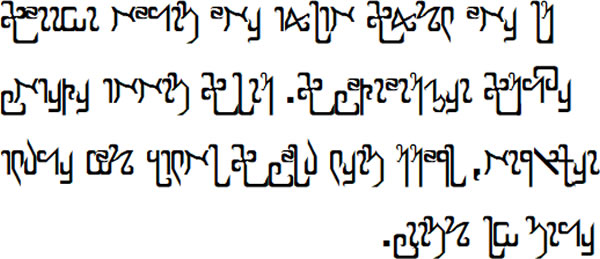Podcast: Play in new window | Download

Here’s the latest news from the world of Omniglot.
New language pages:
- Tai Yo (ไทญ้อ), a Southwestern Tai language spoken in Laos, Thailand and Vietnam.
- Vili (Civili), a Bantu language spoken mainly in the Republic of the Congo, and also in Gabon and Angola.
New adapted script: Vietnamese Arabic Script (چىٰٖ جاوي تيٛەٖڭ ۏیٔەٖط), a way to write Vietnamese with the Arabic script created by Nima Farid.

On the Omniglot blog there’s a new post entitled Jolly Jaunts about the words jaunt and jaunty (which are not related), and there’s also the usual Language Quiz. See if you can guess what language this is:
Here’s a clue: this language is spoken in eastern Mexico.
The mystery language in last week’s language quiz was: Norman (Normaund), a Gallo-Romance language spoken in Normandy in northern France.
In this week’s Adventure in Etymology, entitled Theoretical Theatre, we find out what links the words theory and theatre.
It’s also available on Instagram and TikTok.
On the Celtiadur blog, there’s a new post about words for Masters and related things, and there’s a new Celtic cognates page about words for Vehicles in Celtic languages.
In other news, I went to London this week to see The Warning, a fantastic rock band from Monterrey, Mexico. They put on an incredible show – the best I’ve seen – and looked like they enjoyed it as much as the 5,000 of us in the audience did. They sang mainly in English, with a few songs in Spanish, and on my way to and from the concert, I heard a variety of languages, including Spanish, Portuguese, German, Welsh and Swedish, and even some English.
Here’s a little video I made:
For more Omniglot News, see:
https://www.omniglot.com/news/
https://www.facebook.com/groups/omniglot/
https://www.facebook.com/Omniglot-100430558332117
You can also listen to this podcast on: Apple Podcasts, Amazon Music, Stitcher, TuneIn, Podchaser, PlayerFM or podtail.
If you would like to support this podcast, you can make a donation via PayPal or Patreon, or contribute to Omniglot in other ways.
Radio Omniglot podcasts are brought to you in association with Blubrry Podcast Hosting, a great place to host your podcasts. Get your first month free with the promo code omniglot.









 New writing system:
New writing system: 





